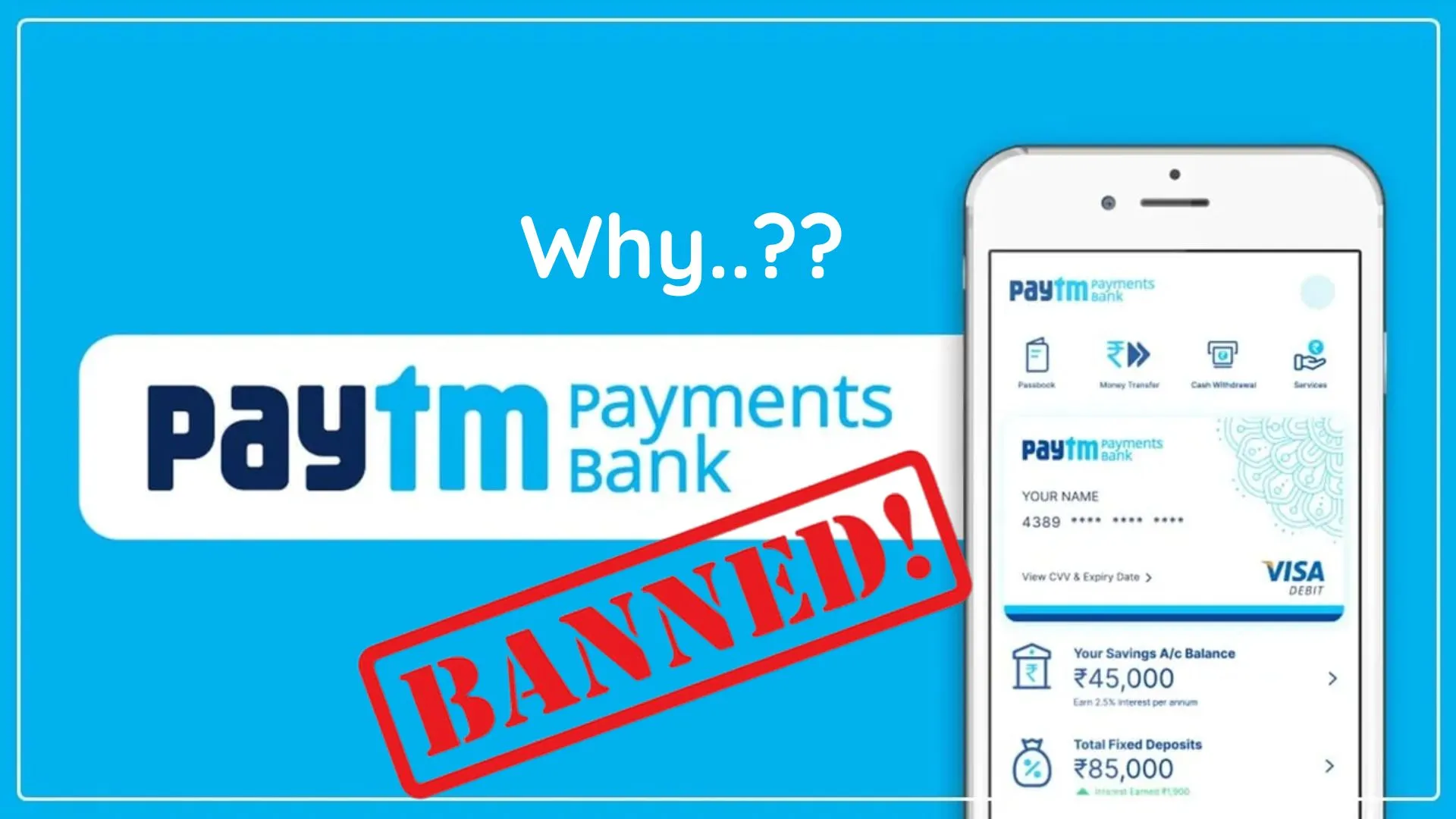ED & CBI Action On PayTM Is Inevitable. Government Must Confiscate PayTm Founder Vijay Shekhar Sharma Passport. Government Must Learn From Vijay Malya & Neerav Modi Cases.

Ban on Paytm Payments Bank
A recent order from RBI states that Paytm Payments Bank won’t be allowed to accept fresh deposits or carry out credit transactions after February 29.
What does this mean for users? Well, starting from 1st march 2024, you won’t be able to add funds to your wallet, prepaid instruments, FASTags, or National Common Mobility Cards.
In essence, all account holders are required to empty their balances and close their accounts. After the announcement it’s Paytm share price fell by 20% on Thursday.
Reserve Bank of India had found 31 crore out of 35 crore Paytm Wallets inoperative in its inspection, cases where a single PAN card was linked to thousands of accounts, absence of KYC for lakhs of accounts and violation of KYC-anti money laundering rules, instances of false compliance reports being submitted by the bank, PPBL’s financial and non-financial business co-mingled with its promoter group companies in violation of licensing conditions, and many other red flags, which pushed the regulator to put stringent curbs on the bank, bringing its operations to a standstill.
This move will impact a significant number of users, including 300 million wallets, 30 million bank accounts, 1.6 billion UPI transactions per month, and eight million Fastags associated with Paytm Bank.

Why is this happening?
According to the RBI, an external audit has uncovered non-compliance with regulations and notable supervisory concerns regarding Paytm’s books. The saga started in March 2022 when RBI barred Paytm Bank from onboarding new customers and mandated thorough audits of its IT systems.
In a nutshell, the RBI isn’t pleased with Paytm Bank’s conduct, and this crackdown is a result of regulatory and compliance issues that have been lingering since March 2022.
Why is RBI unhappy with Paytm?
Well, RBI seems unhappy with Paytm Bank, possibly due to the close connection between Paytm and Paytm Payments Bank. Although these are separate entities, their deep integration appears to be a source of concern for RBI.
Paytm, also known as One 97 Communications, holds 49% of Paytm Payments Bank, with the remaining 51% owned by Vijay Shekhar Sharma, according to the company’s 2022-23 annual report. Paytm Payments Bank encompasses various Paytm services, such as wallets, UPI, utility bill payments, and deposit accounts.
The interlinking of these entities is evident in several aspects. Paytm Payments Bank can only be accessed through the Paytm app, funds from the bank are available solely through the app, and registration and login are exclusively through the app. The Paytm app is the primary platform for promoting and distributing all bank services.
Additionally, all of Paytm’s 330 million-plus wallet accounts and 150 million-plus UPI handles are housed within Paytm Payments Bank. To address this, RBI has instructed One97 Communications Ltd (ONCL) and Paytm Payments Service Ltd to terminate their nodal accounts with the bank promptly. Nodal accounts are specialized accounts for accepting payments from different bank accounts and forwarding them to merchants.
Paytm anticipates a significant impact on its annual operational profit, estimating it to be between ₹300-500 crore.
This projection is a result of customers being unable to add money to their wallets, FASTags, and other services. The restriction follows the RBI’s decision to prohibit Paytm Payments Bank Ltd from accepting deposits or top-ups in any customer account.
Another point of concern for RBI is Paytm Postpaid, a buy-now-pay-later (BNPL) offering for retail users.
While Payments Banks are limited to accepting deposits and cannot provide loans, Paytm offered BNPL services in collaboration with other lenders, offering personal loans up to Rs. 60,000 at 0% interest. This raised concerns as it involved Paytm selling products that a bank is not allowed to sell, leading to confusion among users.
What Triggered The Action
According to one report, the Paytm Payments Bank Ltd (PPBL), had lakhs of non-KYC (Know Your Customer) compliant accounts and in thousands of cases single PANs were used for opening multiple accounts.
These accounts had transactions worth crores.
In a major action against PPBL, the Reserve Bank earlier this week directed the lender to stop accepting deposits or top-ups in customer accounts, wallets, FASTags and other instruments after February 29.
Major Issues
There were instances where the total value of transactions – running into crores of rupees, much beyond regulatory limits in minimum KYC pre-paid instruments raising money laundering concerns
According to an analyst, Paytm Payments Bank has about 35 crore e-wallets. Of this, about 31 crore are dormant while only about 4 crore would be operative with either no balance or a small balance.
An unusually high number of dormant accounts are prone to have been used as mule accounts.
So, there were major irregularities in KYC, which exposed the customers, depositors and wallet holders to serious risk.
Sources said the RBI in 2021 detected serious KYC Anti Money Laundering violations and the bank was directed to address these deficiencies. However, they continued to persist.
The compliances submitted by the bank were found to be incomplete and false on many occasions, sources said.
Accordingly, in March 2022, RBI imposed supervisory restriction on PPBL to stop on-boarding new customers with immediate effect and to appoint an external audit firm to conduct a comprehensive system audit.
There are several cases where the accounts and wallets have been frozen by various law enforcement agencies across the country as such accounts were used for committing digital frauds.
As part of a clean-up exercise, the Enforcement Directorate (ED) in September 2022 had conducted raids at the premises of PPBL and its parent entity One97 Communications Ltd (OCL) and other payment aggregators.
The ED had initiated a probe under the criminal sections of the Prevention of Money Laundering Act (PMLA) after a number of instances of gullible debtors ending their lives came to the fore from various states.
It was alleged that the illegal digital loan companies sourced all personal data of the loan-taker at the time of downloading these apps on their phones.
The agency had said the alleged proceeds of crime in the case were routed through e-wallets and some other payment aggregators.
When contacted, a PPBL spokesperson said, “We can confirm that neither we nor One97 Communications Ltd’s founder-CEO have been the subject matter of investigation by the Enforcement Directorate regarding money laundering.”
Occasionally, some merchants on the platforms have been the subject of inquiries, and the company cooperate fully with authorities in such instances, the spokesperson said.
According to a senior government official, ED would further probe money laundering allegations going forward if required.
Following the RBI’s direction, shares of One97 Communications Ltd, which owns Paytm brand, slumped 40 per cent in the last two days. The stock tanked 20 per cent to Rs 487.05, its lowest trading permissible limit for the day, on the BSE on Friday.
Some instances in past where PayTM has been subject of regulations.
According to one source “This is not an overnight development because the bank has been warned and told to put its house in order for years, but it did not,’’ said a person familiar with the matter. “It was not just one or two issues, but many.”
When the Reserve Bank of India (RBI) barred it from offering banking services, such as accepting deposits and processing payments, the regulator had this long list of accusations, said the people cited above.
Many accounts were being operated by individuals who had been penalised or prosecuted by the enforcement agencies.
In one instance, an account linked to one Permanent Account Number (PAN) was found to be operating more than 1,000 wallets, highlighting a lack of checks. Payment wallets are meant for small transactions, but the fund balance in some were in crores of rupees.
It was also found to be in violation of the policies of the Financial Action Task Force, an organisation founded by the G7 to combat money laundering and stop terror funding. The bank’s processes were found to be in violation of the Prevention of Money Laundering Act as well.
Also, Paytm Payments Bank did not have sufficient systems and processes in place to file regular reports to the Financial Intelligence Unit. All financial institutions, especially banks, are supposed to do this routinely to detect money laundering.
In 2018, following inspections uncovering various violations, the RBI had imposed business restrictions on Paytm Payments Bank as a warning, directing it to put systems in place to comply with banking regulations.
A regulatory inspection in 2022 found inconsistencies in compliance reports that the bank was submitting. At the time though, the regulator signalled there was scope for resolution of these issues.
However, later that year, the RBI barred it from onboarding new customers and an external auditor was appointed to examine its processes. External auditors found that the bank had been lacking in compliance.




